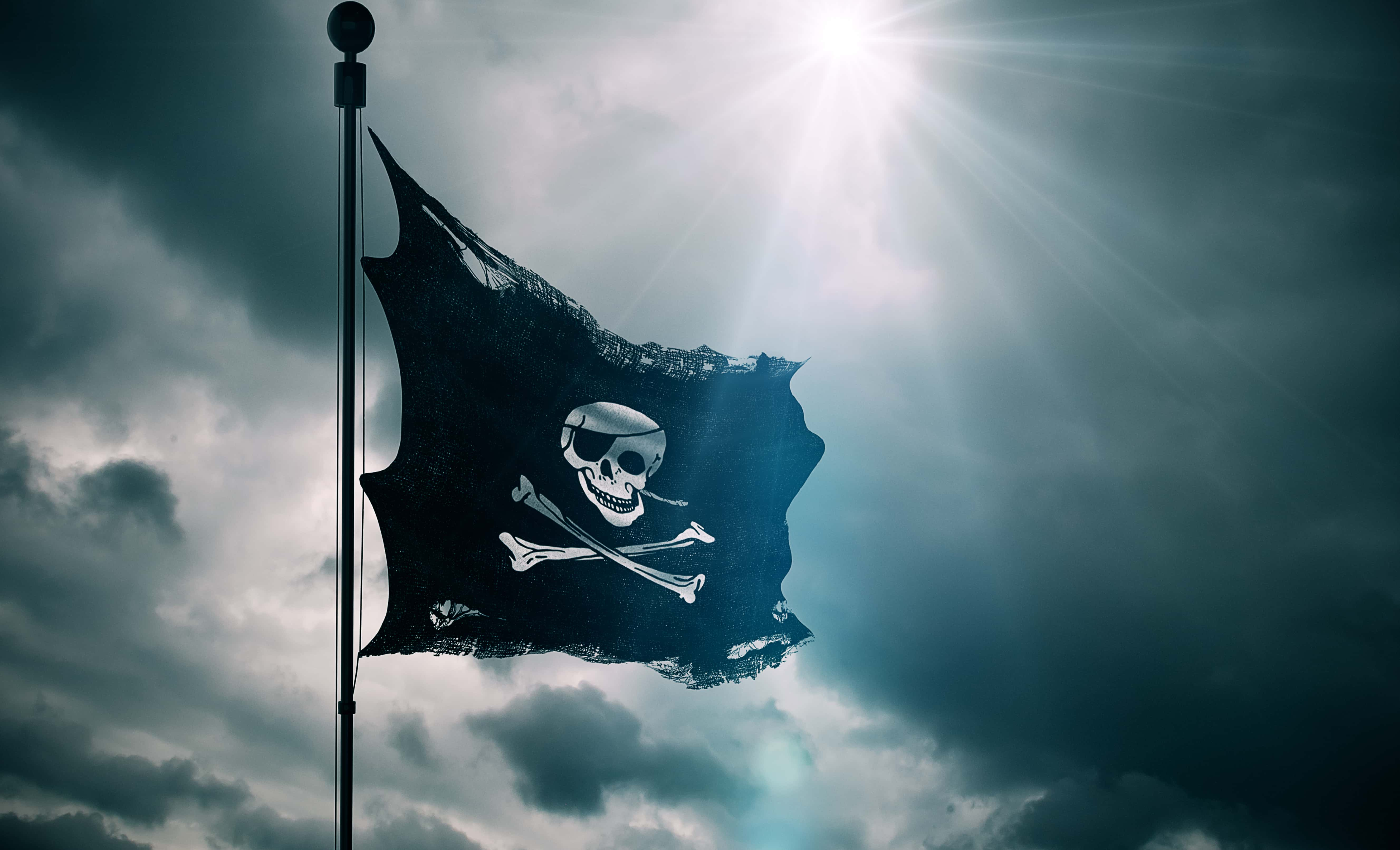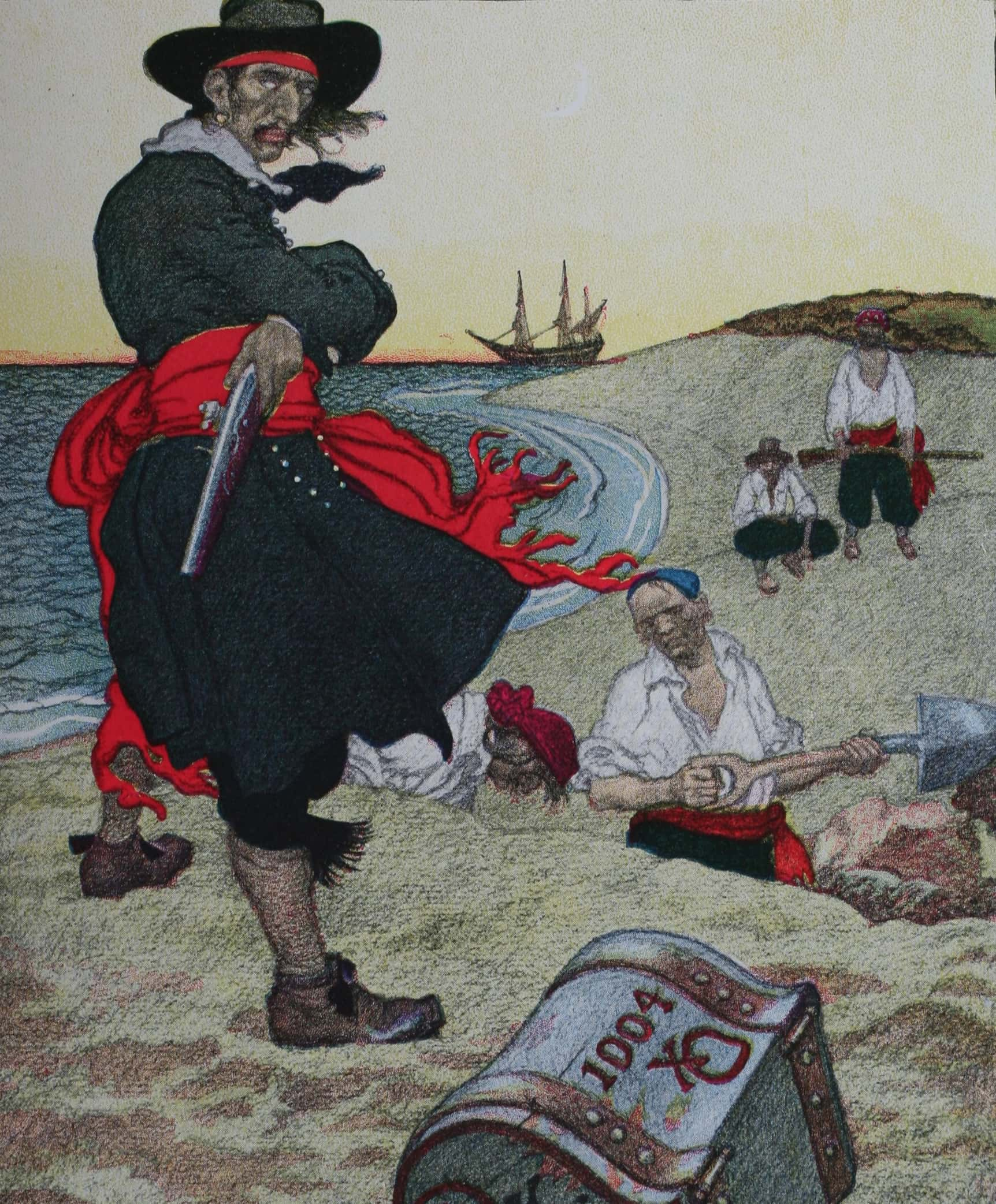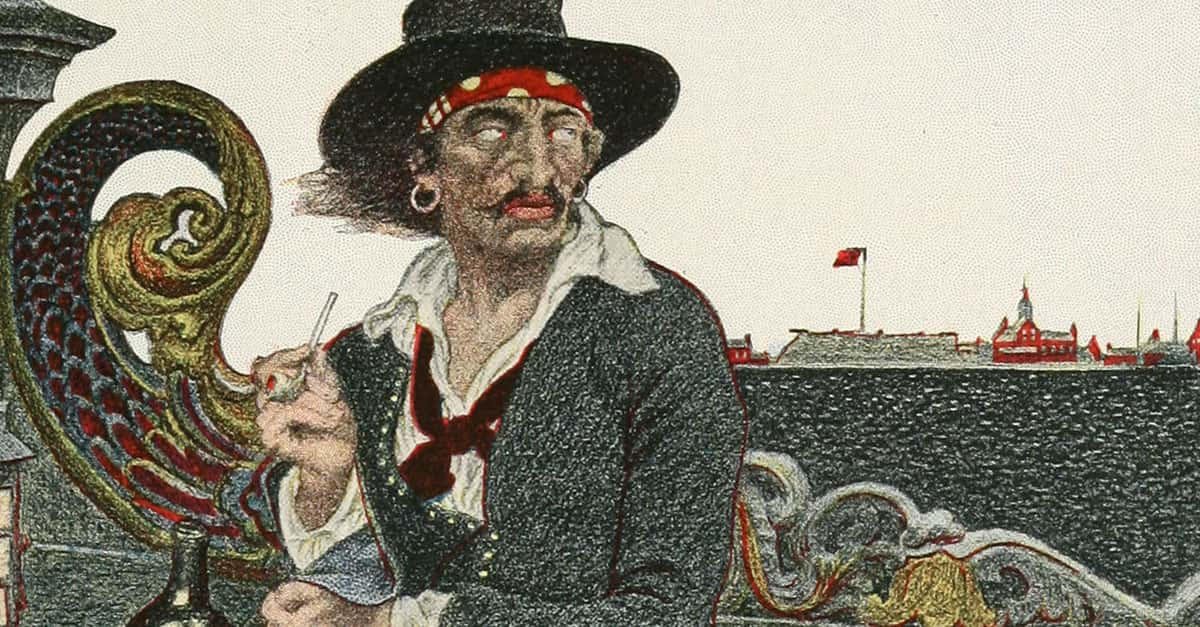Captain William Kidd died with a morbid distinction: he was one of those rare, unlucky people who had to be hanged twice.
The first time they strung him up, the rope broke. Afterward (according to witnesses) the crowd roared for him to be released. They said it was a sign from God. They said he must be innocent. The executioner disagreed. They strung him up again, checked and rechecked the knot. This time, he hung for good. The King had his lifeless body garroted above the River Thames for three years as a warning to would-be pirates.
Captain Kidd died alone and in shame.
But just a few years before, Kidd set sail from New York under the banner of the English king, as one of the richest and most respected men in the New World. What changed?
The story is one of greed, adventure, and betrayal.
 Shutterstock
Shutterstock
Captain Kidd's Mistake
Captain Kidd’s downfall began in New York City, in 1696.
The New York of those days was far from the metropolis we know now. The entire population was a generous 5,000, who subsisted on the meager trade which made its way to the port from more prestigious locales in England or Holland. It was a stinking, ramshackle settlement on the shores of the Atlantic—and the hub for a fair bit of piracy which the Governor, the Earl of Bellomont, allowed to continue in exchange for a cut.
Naturally, when a person was looking to find able-bodied crewmen for a dangerous and lucrative nautical adventure, New York was the place to go.
So it was that on July 4th, William Kidd made his way into the New York harbor aboard Adventure Galley—a magnificent, 32-gun warship, and quite possibly the finest boat that had ever made anchor there. His goal? To recruit sailors for a year-long trip halfway across the world, to chase down pirates (and French ships) under the legal permission of the English King and Governor Bellomont.
At the time, Kidd was a renowned privateer—meaning he operated as a contract agent of the English crown, subduing ships of rival nations as well as pirate vessels.
But when Kidd and his small group of loyal officers went about town, daring any man worth his salt to join the expedition, they were met with resounding disinterest.
The renowned sailors of New York were, for the most part, former and current pirates. Unsurprisingly, few were of a mind to join a government-sponsored trip. Why risk the attention of English authorities? Besides, piracy meant that the crew and the captain split 100% of the plunder. Privateers, meanwhile, split their bounties with countless government officials, as well as the king himself. Why should they bother?
What finally convinced these criminal sailors to join Kidd’s crew was, of course, money. While in harbor, Kidd managed to secure additional financial backing from Governor Bellomont. This allowed him to make a bold proposal to potential sailors: the crew of Adventure Galley would split 80% of the plunder taken.
With the pot now sweetened, 150 hardy sailors quickly joined up, and Captain Kidd sailed from New York to hunt pirates…with a crew of greedy, former pirates to aid him.
 Shutterstock
Shutterstock
(Mis)adventure Galley
Things went wrong for Adventure Galley from the start.
On the voyage across the Atlantic to Madagascar, the crew underwent a horrific bout of cholera that killed almost a third of the men. The rest were left to deal with the pleasures of severe gastrointestinal distress, and an ominous leak in the ship’s hull.
When they reached their destination, between Madagascar and East Africa, things went from bad to worse. In months of trolling the known pirate haunt, they failed to spot a single vessel worth taking. By the late summer of 1697, the crew had begun to mumble about the failed leadership of Captain Kidd.
Kidd, meanwhile, found himself trapped between a rock and a hard place. The miserable crew were desperate to make the voyage profitable and were high on the possibility of turning to full-blown piracy. But Kidd was wary of English authorities; he'd promised his mission would be mindful of the law. Any attacks on legitimate vessels would be met with the force of the Royal Navy.
On October 30, 1967, tensions boiled over.
That morning, a Dutch ship was spotted on the horizon. It was the first they’d seen in weeks. The crew grew restless…
One man had the gall to speak up. William Moore was a ship’s gunner—hardly a high-level position. He was, though, an experienced pirate, and well-loved by the other members of the crew. He shouted to Kidd, for all to hear, that it was time to turn to piracy. Enraged, he demanded the captain take the Dutch ship.
Kidd refused, and with his leadership in question, he called Moore a dog. Moore replied, "If I am a lousy dog, you have made me so; you have brought me to ruin and many more." This was an insult that Kidd could not tolerate. He responded by lifting a lead bucket and striking Moore in the head. The man’s skull fractured instantly. He died the next day.
 Wikimedia Commons
Wikimedia Commons
Controversial Piracy
What happened next is the subject of vigorous historical debate.
Before the year was out, rumors spread among ships on the Indian Ocean that Captain Kidd and Adventure Galley were turned pirate.
Later, at trial, the prosecution asserted that Kidd used piracy in an effort to placate his unruly crew. They’d seen him murder a popular man, it was said, and were speaking openly of mutiny. Looking to secure his own position, Kidd allowed them to attack vessels with impunity.
What seems more likely, though, is that Kidd was simply careless. With a crew that was restless and desperate, he chose to tackle ships that could be argued were within his rights as a privateer—but which could also be considered illegal targets. The rumors of piracy, he felt, would not be enough to sink him. He had a reputation as a fair and honest man. And he still had powerful friends in England and New York.
He may have been right not to worry—until he took the Quedagh Merchant.
 Shutterstock
Shutterstock
A Step Too Far About The Quedagh Merchant
The Quedagh Merchant was no ordinary ship.
At 400 tons, it was twice the size of Adventure Galley. It was also a merchant galley laden with the riches of an entire region—a veritable treasure trove of spices, gold, and silks. But, most importantly, it was under the command of an Englishman, who had contracted with the French East India Company.
It was easily the richest prize of Kidd’s career. It was also his last.
Soon after taking the larger ship, English captain or no, Kidd and his crew ditched the leaky, rotten remains of Adventure Galley and made port with the Quedagh Merchant (now renamed The Adventure Prize) near Madagascar. Almost immediately on arrival, the vast majority of Kidd’s crew abandoned him. They’d received a portion of the Merchant’s treasure—now they were making off like bandits.
This left Kidd in a predicament. He no longer had the men to pilot a grand ship like Quedagh Merchant...and he was beginning to receive reports from England that he’d been branded a traitor to the crown for taking a ship captained by an Englishman.
In a last-ditch effort to save his reputation, Kidd resolved to return to New York. The plan? To thrust himself on the mercy of New York's Governor, who helped to provide the financial backing for Adventure Galley (and was also, in Kidd’s estimation, a friend). With that misguided optimism, Kidd traded the grand old Quedagh Merchant for a small and anonymous sloop and sailed to America—and his own doom.
Betrayal
 Wikimedia Commons
Wikimedia Commons
If Kidd planned on the mercy of friends to save him, he was sorely mistaken.
While Kidd and his men had been raiding around the Indian Ocean, Governor Bellomont was busy ingratiating himself further to the English authorities. He’d now taken a hardline stance against the rampant piracy in the New York area (never mind if he’d helped to encourage it).
So when the infamous and wanted Captain Kidd showed up in harbor, Bellomont seized the opportunity. Without delay, he had Kidd apprehended and imprisoned. Before the Captain would have even realized what was happening, he was transferred back to England and made to await trial in Newgate Prison, the most infamously pestilential institution in the country.
The Trial Of Captain Kidd
The subsequent trial was a media circus. Kidd’s connection to the English crown and the New World elite made a stir in London society. And the sensational charges (piracy, theft, murder!) quickly made Kidd a pariah. The many powerful men whom Kidd had presumed would speak to his sterling reputation were silent. To defend him would only sully their names.
To this day, historians disagree on the extent to which Kidd’s trial was fair. It seems clear that pertinent information was withheld, including Kidd’s experience as a notable privateer and the insubordination he experienced from his crew while on the open ocean. Meanwhile, supposed tales of Kidd’s savagery were embellished by witnesses with little-to-no credibility. Former crew members, looking for leniency in their own sentences, testified against their Captain without shame.
Thus the famous Captain Kidd met his end: reviled throughout the land as a swashbuckling scourge of the sea. Today, he’s remembered as one of the most notorious pirates to ever live. Whether or not he earned that reputation is a question that historians may never truly answer.










